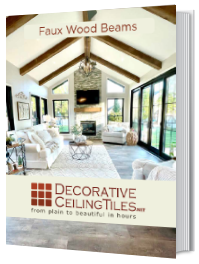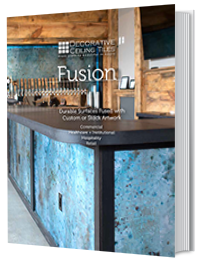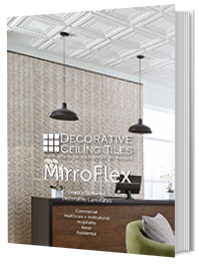What Is a Tin Ceiling Kitchen + Design Tips
Written by Milan Jara on 17th Oct 2022

Looking to quickly elevate your kitchen? Tin ceiling kitchen tiles create a bold statement with a material that has exceptional properties.
Tin ceilings were popular in Victorian-style buildings in the 19th to early 20th centuries, during the time in which plated steel became more easily accessible. Tin ceiling kitchen tiles are an architectural element composed of tin with pressed or embossed patterns. When used in a kitchen, it stands out and can really elevate the look.
A modern tin ceiling is easy to install. Your total cost will depend on the finish, chosen material, and installation cost for your location. Furthermore, tin ceiling tiles are better able to withstand humidity in kitchens and tend to be resistant to fire. Since they are low maintenance and exceptionally durable, this makes them a wise investment.
Common Materials for Tin Ceiling Kitchen
There are several different types of materials that homeowners can use for a tin ceiling. Each has a different look and is beneficial in various ways. To find the best look for your space, you may need to consider what material to use and what color and style to incorporate to liven up this central area of your home.
- Steel. This material is the most widely used. It is generally plated using tin and coated with polyurethane or paint to prevent it from rusting. It may be plated using copper or brass, meaning it will not need a topcoat.
- Aluminum. Aluminum is the lightest choice and must be finished using a clear coat. It is half the weight of steel. It will need to be coated using polyurethane paint or receive an anodizing, preventing it from rusting.
- Stainless Steel. This material does not require any additional coating to maintain its shiny appearance. It is ideal for a kitchen ceiling, backsplash, bathroom, or porch and is best secured using a stainless cone-head nail.
- Copper. If unfinished, this material may develop a patina. To maintain its shiny appearance, you should coat it with polyurethane. It is a perfect addition to kitchen ceilings, exterior applications, backsplashes, and any room with high humidity.
- PVC. PVC is a lightweight material that weighs almost nothing. It is a molded plastic panel that can be painted and resists moisture. PVC is not a metal ceiling but an alternative and can be used for drop ceilings. You can paint it to look like tin.
- Mineral Fiber. Composed of recycled newspapers, starch, and mineral wood, these tiles are embossed and are tongue-and-groove tiles. They install using a furring strip attached by staples or use adhesive to adhere to the ceiling. You can paint them so they look just like metal and are better at sound absorption. However, we do not recommend them in moisture-rich areas.
When it comes to colors, the default tends to be chrome or silver. However, you can purchase it in gunmetal gray, copper, rose gold, gold, etc. Some tiles will come brass-plated or pre-painted. There is also a plethora of patterns to select from.
When selecting a tin ceiling kitchen tile, you must match it to your kitchen’s style. Tin ceilings are easily installed in any space in the home. All you need to do is ensure the ceiling is adequately insulated. Metal is a natural heat conduit and can affect energy consumption/HVAC.
Designs for Tin Ceiling Kitchen
These are some ideas of designs for a kitchen tin ceiling. We outline some ideas according to style and kitchen décor. Also, before you purchase any tin ceiling tile, you may want to examine these tips before making your final selection.
All Walnut Kitchens

Elevate the simplistic style of an all-walnut kitchen with decorative silver tin ceiling tile. This will add an elegant and chic upgrade to the space. Silver will assist in brightening a dark wood finish and can match the surrounding metal finishes of various kitchen appliances.
French Style Kitchens
If you have a classic French style in your kitchen or use lighter materials in your design, your ceiling will benefit the most from a gold tin. Depending on how ornate or upscale you want, some homeowners have also matched the tin ceiling tile with gold crown molding.
To enhance the French style of the look, some have even created a faux coffered ceiling or vaulted ceiling appearance. This is done by using a three-step method of crown molding to create a more rounded look to provide the illusion of depth.
The look begins with a tapered crown molding slightly higher than the second piece blended with a second decorative trim about half the height that blends seamlessly with the first crown molding piece. The third is a curved crown molding that provides the illusion of depth that blends between the crown molding underneath and the ceiling.
Traditional Kitchen

For a traditional kitchen, you can use tin in a peninsula, tray ceiling, and walls. Using decorative styles, you can provide the space with a classical appearance that blends exceptionally well if you have white cabinetry or lighter flooring.
This look works well in a traditional design because it brings an old-world charm to the space.
Modern Kitchen

If you want a more modern appearance, consider using a pre-painted tin ceiling tile that matches your kitchen’s style. This will provide a more contemporary appearance to the kitchen.
Classic Kitchen

Consider using a Greek revival ceiling tile in a copper color for classic kitchens. It looks excellent in a kitchen with a more open floor plan. Its usage can frame the area and provide definition, allowing you to visually separate the kitchen from other areas.
Coffered Kitchen Ceilings

White tin ceilings added to a coffered ceiling in a kitchen can make it look elegant and low-key. It can add a nice texture or contrast to the wood. White will make the area look refreshing and bright. If the wood is light, you can also use a contrasting darker color to create depth.
Final Words
A tin ceiling kitchen is simply installing tin ceiling tiles on your kitchen ceiling. This bold design choice is growing popular because it is an easy way to elevate the kitchen's appearance without a significant overhaul. The change makes it easy to tie in the color of appliances and create a more cohesive appearance.




